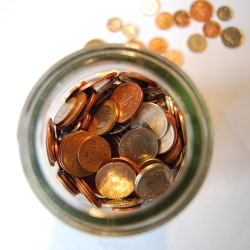Thoughts on Ken Rockwell’s How To Afford Anything
 Already respecting his views on photography, John was interested to find an old article by Ken Rockwell called “How to Afford Anything” a few weeks ago.
Already respecting his views on photography, John was interested to find an old article by Ken Rockwell called “How to Afford Anything” a few weeks ago.
Reading it in parallel, we quickly noted that while there wasn’t anything completely mindblowing for us, it was a mostly excellent article, we agreed with most of it and I would highly recommended reading it regularly. But there are a few points that I disagreed with though and I want to discuss them here. (I’ve quoted random bits of the article so it seems very disjointed but I’ve tried for each quote to make sense within itself.)
Don’t eat out: unless you’re eating off the dollar menu at fast food (as I have always done), cook your own food!
I like food too much to never eat out. We ate out more in the past than we do now but we still eat out once or twice a week. We don’t go to the most expensive restaurants but not the cheapest either: we rarely choose where we’re going based on price.
One thing though: we don’t spend a lot of money on drinks. I don’t drink alcohol and John doesn’t drink wine so we might have a soft drink/beer respectively when we arrive but will then switch onto tap water. We also invariably have better tea & coffee at home than the restaurant can offer so that’s another saving. Not having a restaurant-cheap bottle of wine and after dinner coffees saves us at least £20 a meal – and when the food bill is only £30, that’s quite a “saving”. (Ken does touch on this later.)
I’d class enjoying food as a hobby – I would never spend £2000 on a camera like Ken would, I’d spend it on 200+ curries instead.
Everyone has their own luxuries. Speaking of which:
“A luxury, once sampled, becomes a necessity.”
I personally both agree and disagree with this. Yes, some “luxuries” become necessities (the day I upgraded to a decent bra from budget ones was a special, special day indeed: my perky boobs never looked back) but it’s not always the case – we went on a really expensive (for us) holiday a few years ago but I’ve equally loved holidays since then which have been considerably less glamorous & far-flung – and have cost a tenth of the price. I’m also happy to eat frugal homemade food the rest of the time to pay for those two meals out a week – mostly because our frugal homemade food can be super tasty, but I think I’d feel the same way if it was more humdrum. Well placed luxuries provide variety in life.
Read MoreKeeping track of personal finances – how do you do it?
 How do you keep track of your money from day to day?
How do you keep track of your money from day to day?
Considering my love of both frugality and numbers, I don’t actually have a particularly good handle on my finances. I have a rough picture in my head of things – how much my standard incomings/outgoings are, how much I’ve spent in addition to those, how much I have in savings and how much I have on my paid-off-in-full-each-month credit card – and I check my bank balance reasonably regularly so nothing really passes me by — but I’ve been thinking lately that it would be better if that picture was in sharper focus. It’s hard to say how much growing our own food is saving on our food bill or how much an insulation measure saves us on heating unless we know what we’re spending in the first place.
All my accounts are paperless/internet-based and I use finance software as part of my job so it makes sense to manage things on my computer/online – but I’ve not been able to find an app (either online or offline) that does what I need. I’m not asking for the moon on a stick but I want to be able to import statements from my bank, manually create/delete transactions, define categories & assign stuff to them easily, produce useful reports and most importantly, not feel it’s a chore to do (because if it feels like a chore, it won’t get done). I’ve spent a good number of hours over the last couple of days looking into different options but all either had major show-stopping flaws or were that complicated/clunky to use that I would actively prefer to do actual chores than that.
(Offline, on Ubuntu/Linux, I tried GNUCash, Grisbi, KMyMoney and Homebank. Online, I tried Xero Personal & the very US-focused Mint.com. I also tried to try the multi-platform YNAB – You Need A Budget – but the free trial just wouldn’t download for me, no matter what I tried.)
A couple of friends suggested just using a spreadsheet, which I think are great for overall finance planning but would involve a lot of manual data entry work for keeping a track of every transaction — and I want that “every transaction” focus or I won’t have gained anything over my mental map.
Do you use dedicated software, or a spreadsheet, or some other computer-based method? Or do you still keep a track of things on paper? If so, how does that work out for you? Any advice, tips or software recommendations would be gratefully received!
Read More


